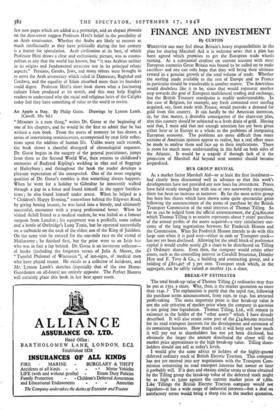FINANCE AND INVESTMENT
By CUSTOS
WHATEVER one may feel about Britain's heavy responsibilities in the plan for sharing Marshall Aid it is welcome news that a plan has been agreed which promises to get the European trade wheels turning. As a substantial creditor on current account with most European countries Great Britain was bound to be called on to make sacrifices and one can only hope that they will bring their ultimate reward in a genuine growth of the total volume of trade. Whether the sterling made available to the rest of Europe and to France in particular should be transferable is another matter. The Americans would doubtless like it to be, since that would represent another step towards the goal of European multilateral trading and exchange, but the British Treasury standpoint is readily understandable. In the case of Belgium, for example, any fresh command over sterling acquired, say, from trade with France, would provoke a demand for gold from this country. It can hardly be the American intention, or' for that matter, a desirable consequence of the share-out plan, that this country should be subjected to a fresh drain of gold. Having said that, I must add that not enough attention has yet been given either here or in Europe as a whole_ to the problems of integrating European economy. The problems are more difficult than many sections of American opinion appear to realise, but a real effort must be made to analyse them and face up to their implications. There is room for much more understanding in this field on both sides of the Atlantic. It would be a tragedy if through lack of it the projection of Marshall Aid beyond next summer should become jeopardised.
BUS GROUP REVIVAL
As a market factor Marshall Aid—or at leait the first instalment— had clearly been discounted well in advance so that this week's developments have not provided any new basis for investment. Prices have held steady enough but with one or two noteworthy exceptions, there has been no increase in turnover. By far the most active group has been bus shares which have shown some quite spectacular gains following the announcement of the terms of purchase by the British Transport Commission of the total interests of Thomas Tilling. So far as can be judged from the official announcement, the £24,800,000 which Thomas Tilling is to receive represents about 7 years' purchase of the annual profits of the assets acquired=a very satisfactory out- come of the long negotiations between Sir Frederick Heaton and the Commission. What Sir Frederick Heaton intends to do with this large sum when it is paid over—either in cash or Transport stock— has not yet been disclosed. Allowing for the small block of preference capital it would enable nearly £6 a share to be distributed on Tilling £r Ordinary shares. Even then, the company would retain other assets, such as the controlling interest in Cornhill Insurance, Daimler Hire and F. Tovy & Co., a building and contracting group, and a holding of £811,407 of 3 per cent. Transport stock which, in the aggregate, can be safely valued at another ][5s. a share.
BREAK-UP ESTIMATES
The total break-up value of Thomas Tilling £i ordinaries may thus be put at 135s. a share. Why, then, is the market quotation no more than 114s. ? The explanation is partly that the rapid rise, following the purchase terms announcement, from 102s. to I 14s. has attracted profit-taking. The more important point is that break-up value is not the sole criterion of market price when the company in question is not going into liquidation. Thomas Tilling, Ltd., will remain in existence as the holder of the "other assets" which I have already described. It will also retain some part of the L24,800,000 received for its road transport interests for the development and extension of its remaining business. How much cash it will keep and how much it will pay out to shareholders has not yet been disclosed, but obviously the larger the amount distributed the closer will the market price approximate to the high break-up value. Tilling share- holders should not sell at today's levels.
I would give the same advice to holders of the highly-geared deferred ordinary stock of British Electric Traction. This company has not yet entered into any negotiations with the Transport Com- mission concerning its road transport interests but sooner or later it probably will. If it does and obtains similar terms to those obtained by the Tilling group the break-up value of the deferred stock might be as high as 3,000 against the current market price of 1,86o. Like Tillings the British Electric Traction company would not liquidate—it has a wide range of industrial interests—but a deal on satisfactory terms would bring a sharp rise in the market quotation..


































 Previous page
Previous page